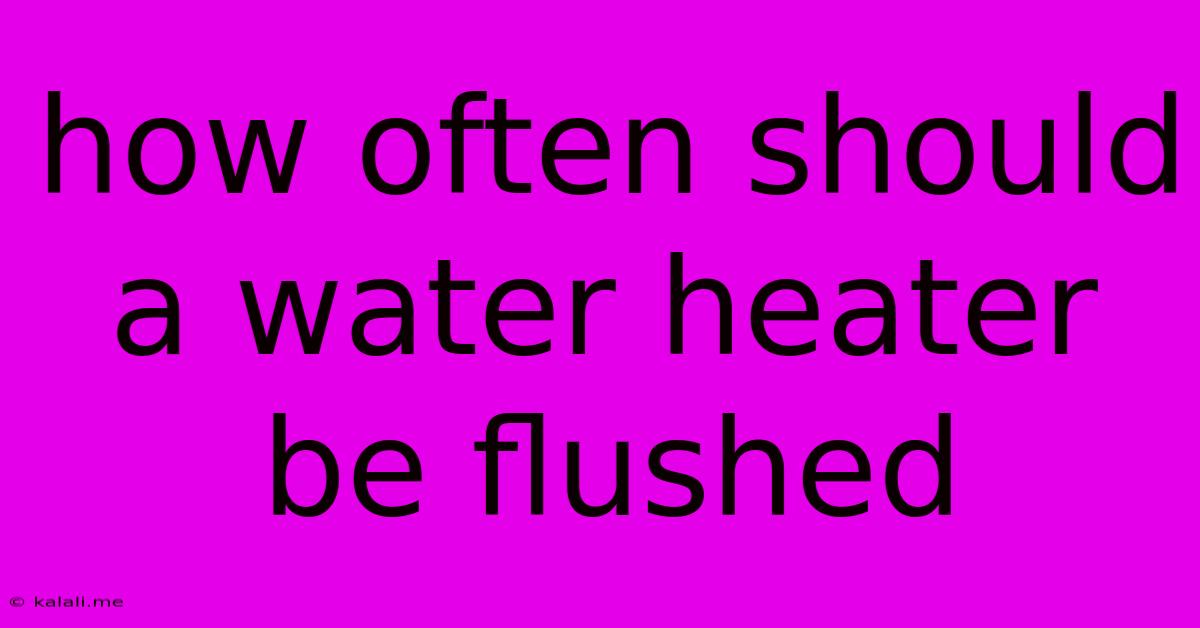How Often Should A Water Heater Be Flushed
Kalali
Jun 04, 2025 · 3 min read

Table of Contents
How Often Should You Flush Your Water Heater? A Comprehensive Guide
Meta Description: Learn how often you should flush your water heater to extend its lifespan and improve efficiency. This guide covers flushing frequency based on water hardness, water heater type, and more, ensuring your hot water system runs smoothly.
Maintaining a water heater is crucial for its longevity and efficiency. A key aspect of this maintenance is regular flushing. But how often should you actually flush your water heater? The answer isn't a simple one-size-fits-all, and depends on several factors. Let's delve into the details to determine the ideal flushing schedule for your specific needs.
Factors Affecting Water Heater Flushing Frequency
Several factors influence how frequently you should flush your water heater. Understanding these will help you create a personalized maintenance plan.
-
Water Hardness: This is arguably the most significant factor. Hard water, rich in minerals like calcium and magnesium, leaves behind sediment that builds up in your tank. The harder your water, the more frequently you'll need to flush. In areas with very hard water, you might need to flush every 6 months. Areas with soft water may only require flushing every 2-3 years.
-
Water Heater Type: Electric and gas water heaters both require flushing, but the frequency might differ slightly. Gas water heaters tend to accumulate sediment faster due to higher operating temperatures.
-
Water Usage: Households with high water usage will naturally accumulate sediment more rapidly. Larger families or those with multiple bathrooms will likely need more frequent flushing.
-
Visible Signs of Sediment Buildup: If you notice a decrease in hot water output, a rumbling sound from the tank, or a reduction in water heater efficiency, it's a clear sign that it's time for a flush.
Recommended Flushing Schedules
While there's no magic number, here's a general guideline based on the factors above:
- Hard Water Areas (high mineral content): Flush every 6-12 months.
- Moderate Water Hardness: Flush every 12-18 months.
- Soft Water Areas (low mineral content): Flush every 2-3 years.
Remember: This is just a starting point. Always monitor your water heater for signs of sediment buildup and adjust your flushing schedule accordingly.
The Benefits of Regular Flushing
Regular flushing offers several key advantages:
- Increased Efficiency: Sediment buildup acts as insulation, reducing the heater's efficiency and increasing energy consumption. Flushing removes this sediment, allowing the heater to operate at its optimal level.
- Extended Lifespan: Sediment buildup can cause corrosion and damage to the tank's interior, ultimately shortening its lifespan. Regular flushing helps prevent this damage.
- Improved Hot Water Output: A clogged tank restricts water flow, leading to reduced hot water output. Flushing improves the flow and ensures you have consistent hot water.
- Reduced Repair Costs: Addressing sediment buildup proactively can prevent costly repairs or even complete water heater replacement down the line.
Conclusion
Regular water heater flushing is a simple yet highly effective maintenance task. By understanding the factors influencing flushing frequency and following a consistent schedule, you can ensure your water heater operates efficiently, lasts longer, and saves you money on energy bills and potential repairs. Remember to consult your water heater's manual for specific recommendations and always prioritize safety when performing any maintenance.
Latest Posts
Latest Posts
-
How To Secure Dishwasher To Granite Countertop
Jun 06, 2025
-
Steering Wheel Vibration At Low Speed
Jun 06, 2025
-
How To Test A Circuit Breaker Without Power
Jun 06, 2025
-
Can You Breed Outside Of Your Genus
Jun 06, 2025
-
How Much Baking Soda To Add To Expired Cake Mix
Jun 06, 2025
Related Post
Thank you for visiting our website which covers about How Often Should A Water Heater Be Flushed . We hope the information provided has been useful to you. Feel free to contact us if you have any questions or need further assistance. See you next time and don't miss to bookmark.